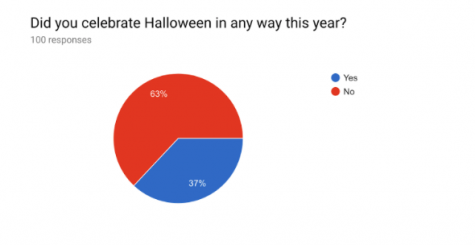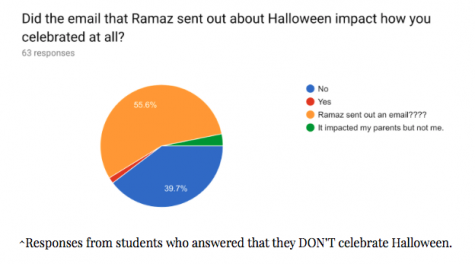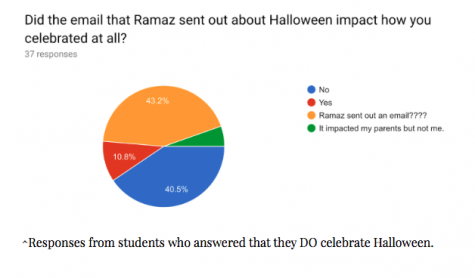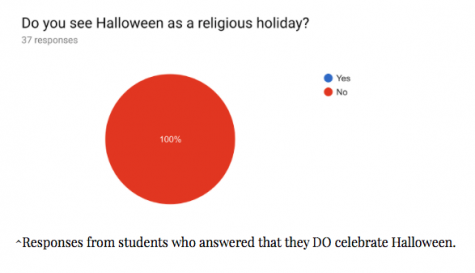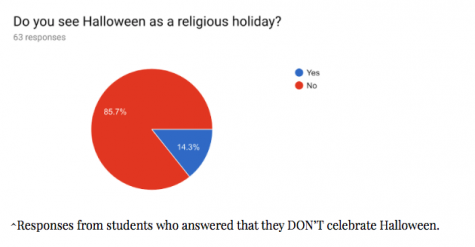Boo: A Ramaz Halloween
“Ramaz supports the stance of refraining from celebrating Halloween, while recognizing and respecting the need for parents to make decisions for their families regarding personal home practice,” read an email sent out to the Ramaz parent body a few days before Halloween. The email, signed by Mr. Cannon and all three division heads, reminded parents that Halloween has pagan origins and had been a day of pogroms and anti-Semitism for Jews in Europe. “These associations have led Jews to refrain from participating in Halloween activities even though, like many American religious observances, Halloween has taken on a distinctively cultural, secular, and commercial tone in contemporary society.”
Emails such as this one have been sent out yearly before Halloween, though generally solely to parents. According to Rabbi Slomnicki, the goal of these emails is “to address a communal concern of Jewish kids participating in a non-Jewish activity.”
A survey sent to the Ramaz student body found that 37% of the students did participate in Halloween in some way. Within that 37% of the student body, 22% (or 8% of the student body) handed out candy but did not go trick-or-treating, 38% (14% of the student body) wore a costume, 41% (15% of the student body) went trick-or-treating, and 60% (22% of the student body) went to a Halloween party.
Regardless of these percentages, it seems that Ramaz’s Halloween email had little to no impact on the students. Of the students who did celebrate Halloween, only 11% responded that the email impacted how they celebrated, 43% weren’t even aware that an email was sent out, and 41% said it didn’t impact how they celebrated. Of the students who didn’t celebrate Halloween, the impact of the email was even smaller. 2% of this group said the email impacted them, and an additional 3% said it impacted their parents but not them. 56% were unaware that an email was sent out and 40% said it didn’t impact them.
“Not only did I have no clue that Ramaz sent out an email,” said one student, “but I also didn’t hear from anyone that I shouldn’t be celebrating. So if it weren’t for my own reasoning and my own prior knowledge of this non-Jewish holiday, then I probably would have gone trick-or-treating.” Another student wished that Ramaz would “say why we don’t [celebrate] it and explain it in class, not just send an email.” It seems that having discussions about Halloween at school or at least including students on the Halloween email sent to their parents could have a much greater impact. According to Rabbi Slomnicki, the fact that students didn’t receive the email was “an oversight,” but he hopes teachers would be open to discussing Halloween and its cultural significance. Rabbi Slomnicki himself usually discusses Halloween in his Talmud classes.
Furthermore, the vast majority of Ramaz students do not regard Halloween as a religious holiday, perhaps explaining why it is considered acceptable by Ramaz students and their families. 100% of those who celebrate Halloween and 86% of those who did not celebrate agree that Halloween is not a religious holiday. Only 14% of the students who did not celebrate, equivalent to 9% of the student body, see Halloween as having any religious significance.
The general consensus seems to be that while most Ramaz students don’t celebrate Halloween, students don’t really see a problem with religious Jews participating in the holiday. Many students argued that Halloween should not be considered a religious holiday because today, “most Americans consider the holiday to be a national tradition – much like Thanksgiving – without the attachment of any religious significance.”
Mr. Deutsch differentiated between Thanksgiving and Halloween: despite Thanksgiving’s religious origins with the Pilgrims, American presidents including Abraham Lincoln have declared it a national holiday, so “really Thanksgiving is an American holiday. It’s not like descendants of Puritans or Pilgrims in other countries are celebrating Thanksgiving. Halloween by contrast, is still connected to the Christian calendar, and the reality is that if you live in NYC, All Saints’ Day is an alternate side parking suspension day, which as a guy with a car in NYC, is the ultimate authority on what is a religious holiday. So until Halloween is either declared a national holiday or we have alternate side parking, I think it remains a religious holiday.”
One student added, “No non-Jew I have asked has ever said that they celebrate Halloween for religious reasons. At this point, the only people who view it as a religious holiday are Jews.” Another student even put a Jewish spin on the reason celebrating Halloween is acceptable, stating that “I think there’s a line between going through routine actions and believing in religious significance behind them. Some mitzvot in Judaism don’t really ‘count’ if they’re done without Kavanah; so too, celebrating Halloween non-religiously should not be taboo.” Overall, many Ramaz view Halloween as about costumes and candy with no religious significance, and for that reason, there is no reason to exclude Jews from the celebrations.
Responding to this, Rabbi Slomnicki argued that “part of the assimilation of being in America is that the people around us aren’t religious – they don’t take their religion seriously.” At its core, Halloween is a religious holiday, but since so many people in America aren’t religious, they don’t treat it as such. Because he views it as a pagan holiday, Rabbi Slomnicki was surprised when he started teaching at Ramaz and found out that Ramaz students celebrated Halloween. “It wasn’t part of my culture when I was growing up,” he said, “I was surprised when I came here and kids told me that they participated in the activity. I was like – you’re Jewish! [But] on a personal level, I struggle with it because I have a daughter in public school.”
Mr. Deutsch agrees that “Institutionally, if the school wants to say ‘don’t do it,’ that’s fine – it is a Jewish institution.” However, Deutsch also argued that “in the context of things which Jews do that they shouldn’t do, [celebrating Halloween] is so far down the list” and there are many other issues to focus on before this one.
Additionally, a sizeable group of Ramaz students asserted that participating in Halloween is tantamount to celebrating antisemitism. Halloween “is a holiday on which is was considered okay to kill Jews and many pogroms happened,” said one student. “By celebrating Halloween, we are essentially sending the message that we don’t mind [the pogroms and anti-Semitism],” added another.
“Every time one of these emails goes out about pogroms and anti-Jewish violence on Halloween, I send a lunatic rant to whoever sent it,” said Mr. Deutsch. “Historically, there is no evidence to support that.” According to Mr. Deutsch, there are two problems with how religious Jews approach Halloween. First, the historical inaccuracy: Mr. Deutsch believes that the idea of pogroms on Halloween was an invention by religious institutions like the OU to prevent Jews from celebrating Halloween: “If you go online, you’ll see all these websites [about pogroms on Halloween], none of which actually cite anything. I’ve looked and I’ve found no evidence that Halloween was a particularly awful day for Jews.” The second issue is a question of the Jewish approach to the secular world. “Halloween doesn’t have to be evil or awful or antisemitic,” said Mr. Deutsch, “Halloween is a perfectly lovely holiday; it simply is a Christian holiday. That should be enough.”
Even among students who didn’t celebrate Halloween, several believed that the school shouldn’t be voicing an opinion about students’ actions off school grounds. “Outside of school, Ramaz shouldn’t comment on students’ religiosity,” said one student, “Every family does their own thing, if a religious family is comfortable with observing all the chagim as well as celebrating Halloween, then so be it.” Another student believes that “Ramaz shouldn’t control our religiosity in our own homes. As long as we don’t bring it to school and it doesn’t harm others, I don’t see why it’s a problem.”
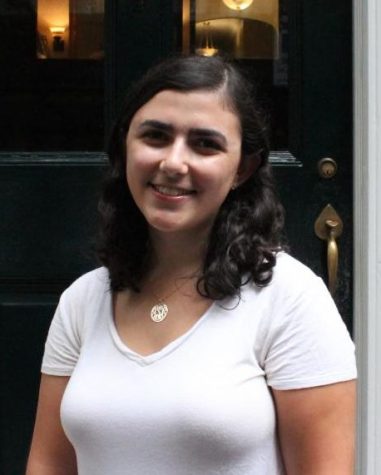
Josephine Schizer has been writing for the Rampage since her freshman year and is excited to be serving as Co-Editor-in-Chief. Outside of Rampage, Josephine...


